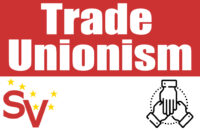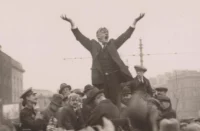The Trade Union Left Forum has been campaigning for the last four years to have the restrictions on workers’ rights contained in the Industrial Relations Act (1990) abolished. At the biennial delegate conference of the Irish Congress of Trade Unions in October this campaign took a step closer to achieving its aim with the adoption of a motion from Dublin Council of Trade Unions, as follows:
“Conference recognises that the restrictions on trade union action in the 1990 Industrial Relations Act need to be opposed, and that the Act should be reformed to restore rights which trade unions had before 1990. Conference mandates the executive to seek an alternative legislative regime which would allow trade union and industrial action for individual workers, for issues that concern workers across society and across employers, and for effective solidarity to workers in dispute.”
This is now the policy of the ICTU and all its affiliated trade unions. Under the 1990 act, individual workers’ disputes had to exhaust all the mechanisms of industrial relations before any industrial action could be taken on behalf of the individual worker. This in reality meant that industrial action could be delayed for many months, if not years, by which time the case would have run out of steam.
This was also used as a bullying mechanism, whereby shop stewards have been victimised by employers, and even sacked, as a warning to other workers. Employers were happy to pay a few thousand euros’ compensation in an unfair dismissal case to get rid of militant shop stewards. This intimidated other workers by getting rid of their leader.
Issues of concern throughout society referred to in the motion include removing the ban on political strikes, which will be necessary in coming years as the neoliberal government seeks to privatise all remaining state assets, businesses, and companies.
Strikes against privatisation were deemed political and so banned under the 1990 act. This motion opens up the possibility of industrial action over everything, from housing to boycotting Israeli goods.
Effective solidarity for workers in dispute will allow for secondary picketing and support strikes, which were also made illegal under the 1990 act. In fact the motion calls for all rights lost under the 1990 act to be restored under new legislation, which the ICTU and its affiliates are now compelled to fight for.
This is a major step on the journey to restoring workers’ rights lost under the 1990 act and to tip the balance of power pack towards workers and away from capital. Pressure must be mounted on the political class to force them to act to restore these rights as soon as possible. It is up to workers to raise it at the branch level in their own unions and to have a campaign of relentless pressure from within the trade union movement to get this workers’ rights act into legislation and not allow this to be just another motion passed at Congress to be left to gather dust on a shelf in ICTU head office.
On 8 April 1916, two weeks before James Connolly led the Irish Citizen Army down to the GPO, he wrote in the Workers’ Republic: “Legislation does not control the Lords of Industry; it is the Lords of Industry who control legislation. As we have often put it: The Class which rules industrially will rule politically.”
This statement captures the essence and the reason behind the Industrial Relations Act. It was introduced as the legislative controlling mechanism on workers, unions, and actions taken in pursuit of workers’ demands against the lords of industry.
The trade union movement is at a significant crossroads, where we can choose to struggle, fight, grow and raise the expectations and class-consciousness of workers or to be further incorporated in the structures of the state, representing only an elite of public and private-sector workers, increasingly distanced from working people and increasingly irrelevant to the struggle for equality and a better Ireland.
The COVID pandemic has laid bare the reality of life for many workers in Ireland today: a housing crisis, the second-highest level of low pay in the OECD, precarious work, and a lack of workers’ rights.
It is our duty as trade unionists to stand by our fellow-workers and fight to improve pay and conditions and to bring an end to precarious work, short-term and minimum-hour contracts, the gig economy, and bogus self-employment, which have all flourished since 1990. This will be possible when not restricted by the Industrial Relations Act.
Today, three out of every four workers are not in a union. We must ask ourselves why this is so. Workers no longer see unions as having their back, as they did in the past before the 1990 act, when they had power over their own destiny and they decided when and where they went on strike or the type of action they initiated.
The new legislation required as a result of this motion will arm workers to fight for change by regaining the rights lost as a result of the 1990 act and finally tip the balance of power back to workers. This is confined to the South of Ireland; Thatcherite anti-union legislation in the North has to be tackled also with legislative change.
This development must mark the return of the radical trade union movement and reawaken the sleeping giant of organised labour.






